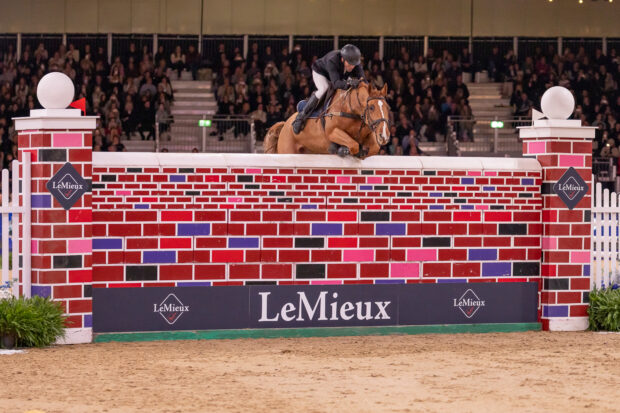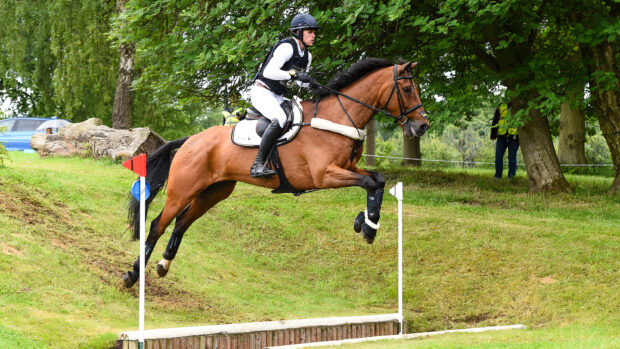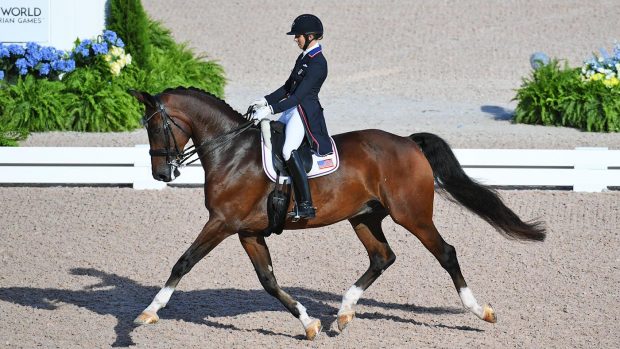The spectacular bay, who was put down on 20 March 2023 aged 30, was a true five-star model event horse, winning three majors and clinching the sport’s first Rolex Grand Slam for Pippa Funnell, says Kate Green, in this piece from the H&H archives
Primmore’s Pride was the horse that provided two-thirds of Pippa Funnell’s epic Rolex Grand Slam in 2003, a feat achieved in the days of “proper” long-format (with roads and tracks and steeplechase) and setting a record that cannot be broken.
If ever there was a horse produced for traditional eventing, Primmore’s Pride was it, but this tall, leggy bay gelding, a spectacular sight to see at full stretch across country, ended up straddling the two formats. It was unfortunate timing in that it arguably denied him higher honours at the Athens Olympic Games in 2004, but he did go on to make history as the last long-format winner of Badminton, in 2005.
Expectation surrounded Primmore’s Pride (stable name “Kiri”) from birth; he was bred in the purple and was an eyecatcher at the 1993 High Performance Sale. The successful bidders, Denise and Roger Lincoln, first sent him to Pippa as a two-year-old.
“He’s probably the only horse that I really thought from the start was going to be very special, so light on his feet and so extravagant,” Pippa recalls.
“If I had any single doubt about him, it was that he could be spooky. We were at Great Missenden when he was six and, 10 strides out from going into a wood, he spun round because of a patch of sand.
“He was also quite an arrogant horse; if you gave any of the others attention, he would bash the door. It was all about him and he could be a bit of a thug, but he was beautiful to ride and sit on. And he was very smart on the flat – he got three 10s for his extended trot in Athens. The crowd gasped so loudly, I thought I must have gone wrong.”
When Kiri won at Le Lion d’Angers in 2000, French journalists became very excited about his pedigree and no wonder, for this competition has regularly pointed the way to greatness.
‘A momentous occasion’

Pippa and Primmore’s Pride after their Badminton victory
Three years later, Kiri won Kentucky and would have been earmarked for the European Championships, but the selectors agreed to allow Pippa the best chance of the Grand Slam by taking him to Burghley in 2003. Nearly 20 years on, no one who was there will forget the tension and the magnitude of the occasion, Pippa having put herself in line for the prize with victory at Badminton on Supreme Rock four months earlier.
Cross-country day at Burghley had ended with Pippa and Kiri on the same score as Zara Phillips (now Tindall) and Toytown, who held the lead by dint of their faster round. Next day, under sick-making pressure, Pippa pulled off a brilliant clear round, while Zara lowered a rail.
“He was simply fantastic,” she wrote in her autobiography. “A picture taken by Trevor Meeks of me smiling from ear to ear as we cleared the last fence was on the cover of Eventing magazine, and it summed up my feelings perfectly… I knew there was nothing else I could do and that I’d done my best.”
As Zara entered the arena, Pippa and Zara’s father, Mark Phillips, stood tensely together in the collecting ring – and then the crowd gasped. Mark was instantly generous, while Pippa burst into tears.
“Still, I was dimly aware that this day was actually bigger than me,” she says. “It was a momentous occasion for the sport of eventing.”
An Olympics full of ‘if onlys’ for Primmore’s Pride

Pippa Funnell and Primmroe’s Pride in the showjumping at the 2004 Athens Olympics.
The next year came Athens, for which Kiri was an obvious favourite. After exhaustive debate, it was run without steeplechase and roads and tracks – the rest of the sport soon followed suit. This contentious decision had been, in part, driven by the fact that the course in Athens was on a tiny site; the cross-country ran up and down a slim green strip of grass amid the concrete of the Markopoulo stadium and several riders were dismayed by the lack of technicality and “beef”.
“All my best rides on Kiri were at the three-day events because the chase took the edge of him,” Pippa explains. “It’s one of my biggest regrets not winning at Athens and it was so frustrating that it was not run in the old format.
“The track couldn’t have been worse for him. It wasn’t big enough to back him off and the second half was downhill, and he could be difficult to ride by that stage as he would get strung out and strong and run into the bottom of fences. Yes, we got an individual bronze, and if we hadn’t hit the planks [in the second showjumping round] we would have won, but the whole competition was full of ‘if onlys’.”
It took all of Pippa’s horsemanship to steer Kiri safely around, incurring 11 time-penalties. In those days, mainstream sports journalists would attend the big cross-country days and they asked why the horse had been selected in the first place. But, as performance manager Yogi Breisner (see below) pointed out, you could hardly leave behind a dual four-star winner who was brilliant on the flat and a superb jumper.
After such high expectations, the team was now fourth due to the withdrawal of William Fox-Pitt‘s gold medal prospect Tamarillo with a bone chip. By the end of a rollercoaster final day, things had improved. “At least we’re going home with a [bronze] medal around our necks and not a noose,” was how Pippa put it at the press conference.
Leslie Law, who jumped two clears on Shear L’Eau, went up to individual silver and Pippa to fourth. However, three days later, in one of the eventing’s biggest upsets, everyone moved up a position when Bettina Hoy, who had erroneously gone through the start twice, dramatically lost her gold medal, and Germany’s team gold, in the Court of Arbitration for Sport.
His later life

Pippa and Primmore’s Pride
Kiri’s star was to burn out abruptly. After winning Badminton in 2005 as a 12-year-old, a small but niggling injury – to the ligament of the back of the knee – ended his career. At one stage, he felt so good that Pippa rode him in one last event, at Highclere, where he was “magic”, but it was only a brief respite.
Fortunately, Kiri had always done well and been happy out in the field, so enjoyed a long retirement remaining in the Lincolns’ ownership. When asked for the highlight of his career, Denise answers touchingly: “That he has had this wonderful long life and been a happy horse. He has benefited both from Pippa’s kindness and cleverness and from his relaxation at home with us.”
‘There was this fab foal’: the story behind Primmore’s Pride’s mother
Roger and Joanna Day were driving over the Brendon Hills in west Somerset when they stopped for a picnic. There, in the field, was a “fab foal” bred by Quantock farmer Philip Salvidge.
“She was really attractive,” recalls Joanna. “Dark bay and with a leg at each corner. We said, ‘That’s going to win Badminton.’”
The filly, Primmore Hill, was by Ben Faerie out of a cobby hunter mare, Star, and she did make it to Badminton, finishing ninth in 1982 with Nicky Stephens. She was also a Grade B showjumper, hunted with the Taunton Vale, and carried sacks of corn around the farm.
Her fourth foal, and first colt, was Primmore’s Pride, by Mark Todd’s New Zealand thoroughbred Mayhill.
“We chose Mayhill because he was very athletic with a long neck – Prim was chunky and short in the neck,” says Joanna.
All eyes were on the striking colt at the 1993 High Performance Sale, where he was the highest priced foal. The audience went silent as Joanna lunged him.
“Someone had said that I would never be able to, but I wanted to show off his beautiful movement and not just have him galloping around,” she says.
Happily for the Days, his purchasers, the Lincolns, involved them all along the way. When the Days couldn’t be at his Kentucky victory, Badminton later presented them with a replica rose bowl.
“The Lincolns were so kind and invited us to everything,” says Joanna, “but of course the real luck was in having Pippa ride him. She made the horse.”

Pippa Funnell on Primmore’s Pride at Burghley Horse Trials
Yogi Breisner: ‘I was absolutely awed by him’
Yogi Breisner first came across Primmore’s Pride when judging the gallop at a Burghley Young Event Horse qualifier in 2000, the year he was appointed manager of the British eventing team.
“I really, really liked him, but thought he might be a half-gear short of speed,” he recalls. “Then a couple of years later, I remember Pippa bringing him out to Pau before he won at Le Lion and I was absolutely awed by him.
“He was fabulous in the dressage and so scopey in his jump, a big-striding horse who was more of a relentless galloper than quick – he usually had a couple of time-faults. Athens didn’t suit him at all and Pippa did a brilliant job at getting him around. It was an irony that, in the end, if she had managed to jump two clear showjumping rounds, she would have won gold – he so rarely had a fence down.
“Primmore’s Pride was a burst of brilliance and, at his height, alongside horses such as Tamarillo, Toytown and Galan De Sauvagère, he was one of the best in the world, but then Pippa was – and still is – one of the best producers in the world.”
Primmore’s Pride’s career in numbers
- 5 international wins
- 3 four-star wins (now five-stars)
- 2 Olympic medals (team silver and individual bronze)
- 2000: 4th Punchestown, 1st Le Lion d’Angers
- 2001: 4th Blenheim
- 2002 2nd Punchestown, 6th Burghley
- 2003 1st Kentucky, 1st Burghley
- 2004 1st Chatsworth, team silver and individual bronze Athens Olympic Games
- 2005 1st Badminton
You might also be interested in:

Goodbye to one of eventing’s greats – triple five-star winner put down aged 30

Pippa Funnell and Tina Cook on pregnancy confidences, nerves and why you need good mates

Position, polework and partnership – 13 insights from Pippa Funnell’s demo at London

Subscribe to Horse & Hound magazine today – and enjoy unlimited website access all year round
Horse & Hound magazine, out every Thursday, is packed with all the latest news and reports, as well as interviews, specials, nostalgia, vet and training advice. Find how you can enjoy the magazine delivered to your door every week, plus options to upgrade your subscription to access our online service that brings you breaking news and reports as well as other benefits.




